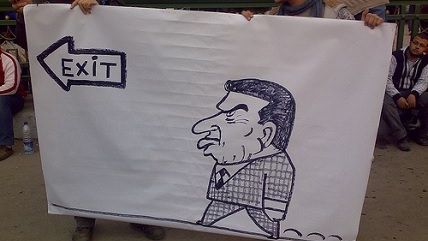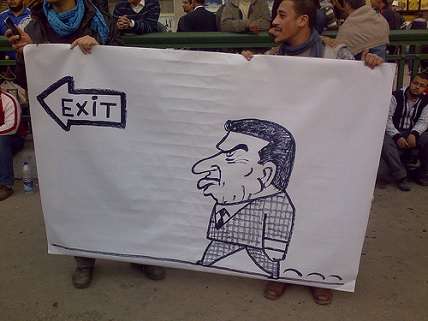Hosni Mubarak Can't Be Detained for Killings During 2011 Uprising, Being Held for Corruption Instead
Nothing changes


Former Egyptian strongman Hosni Mubarak, in power for more than twenty years, resigned the presidency in February 2011 after some two weeks of protests in Cairo and around the country. Within a few months he was charged with deaths related to the crackdown of the Arab Spring protests as well as general corruption. Mubarak was eventually found guilty and sentenced to life for failing to prevent the killing of protesters during the crackdown. That conviction, though, was overturned on a technicality in January, and Egypt's high court ordered a re-trial. This weekend the new judge withdrew, indefinitely delaying the trial, and today another court ruled Mubarak could no longer be detained for the charges related to his re-trial. Instead, he'll be detained for the corruption charges.
Meanwhile, the new president, Mohammed Morsi, appointed a committee to investigate government crimes during the 2011 revolution. A portion of their report, submitted in January but not made public, was leaked last week. It accuses the military, which touted itself as a neutral force during the uprisings, of torture, kidnapping and murder. The military denies the allegations, and Morsi rejected "insults" against the armed forces. Earlier this month, the State Department condemned Egypt for targeting dissent after a popular satirist was detained and questioned for "insulting" the president and Islam, a tactic also used under Mubarak. An autumn power-grab by Morsi led to the presidential palace being stormed again in December. That nothing's changed appears to be a common opinion in Egypt, and with continued funding coming from the United States, in Washington too. The American largesse helped Mubarak, now being held for corruption, amass a fortune upward of $40 billion.
Editor's Note: As of February 29, 2024, commenting privileges on reason.com posts are limited to Reason Plus subscribers. Past commenters are grandfathered in for a temporary period. Subscribe here to preserve your ability to comment. Your Reason Plus subscription also gives you an ad-free version of reason.com, along with full access to the digital edition and archives of Reason magazine. We request that comments be civil and on-topic. We do not moderate or assume any responsibility for comments, which are owned by the readers who post them. Comments do not represent the views of reason.com or Reason Foundation. We reserve the right to delete any comment and ban commenters for any reason at any time. Comments may only be edited within 5 minutes of posting. Report abuses.
Please to post comments


Morsi rejected "insults" against the armed forces.
Know who else rejects "insults" against the armed forces?
All those comedians who worked the Iraq circuit for the last decade?
Egyptian strongman Hosni Mubarak...
I thought one of the primo benefits of being a "strongman" was not having to worry about corruption charges.
So you're saying that Mubarak came close to...walking?
How would he have walked? Would there be any particular nationality he would have walked like?
That's not funny!
Egyptians aren't paying all that much attention to this little sideshow.
The country is broke and going hungry. They're getting handouts (loans) from Libya and the gulfies to not pay their gas bills and not buy food.
It's going to get really clastraphobic on the Nile soon.
http://www.atimes.com/atimes/M.....50413.html
Well, to be honest, most sovereign nationa recognize a right of other sovereigns to kill their own subjects in order to maintain power. But outright visible corruption? That's just distasteful and should be discouraged among the sovereign set.
A swift and sure death penalty prevents overturning convictions on "technicalities". They didn't cut Il Duce down from the lamppost for a new trial.